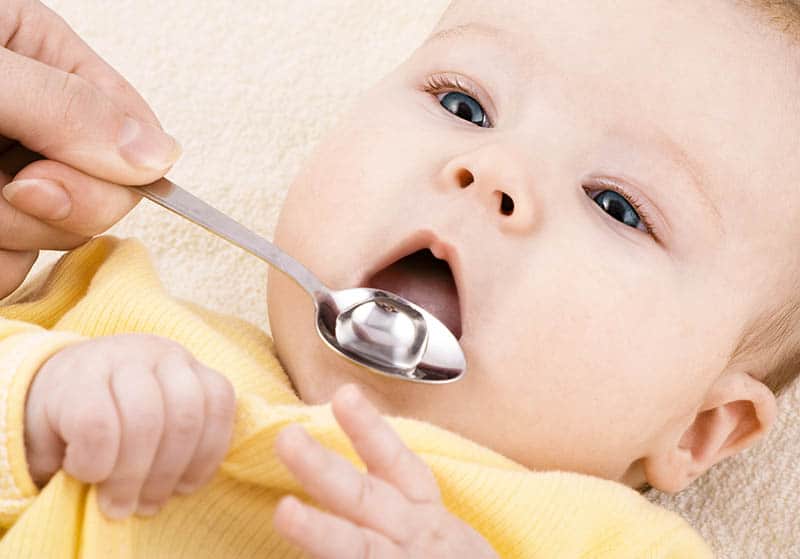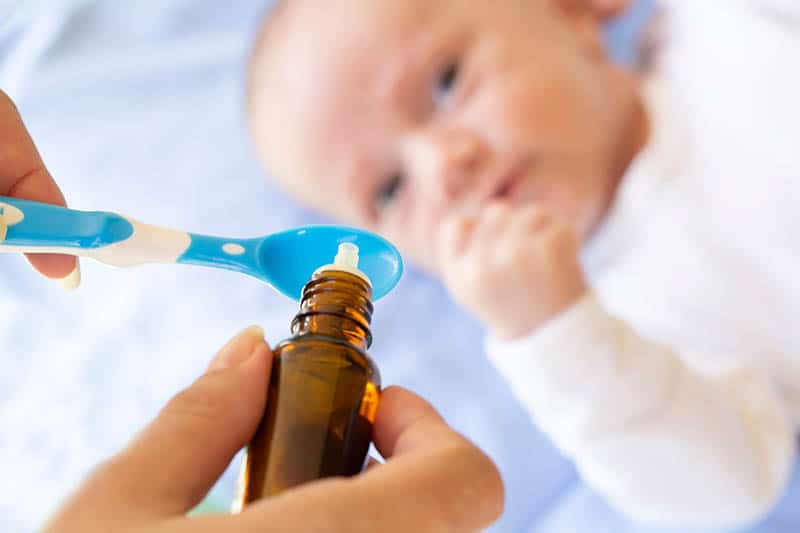If you’re reading this article, you’re probably dealing with a cranky baby.
And what’s worse, nothing seems to be helping! But a natural remedy called gripe water may just help your fussy newborn.
Gripe water soothes symptoms of colic, hiccups, cramps, and other stomach discomforts. It can even help your little bundle of joy with teething pain!
And hopefully, give you some precious sleep.
The original recipe goes all the way back to the 19th century.
Back then, it contained alcohol (crazy, I know) which people thought could help babies relax. Newsflash – it doesn’t!
If you’re like me, you’re probably skeptical of anything that claims to be all-natural.
But modern-day, thankfully non-alcoholic, gripe water usually contains fennel, ginger, or chamomile.
But as any parent knows, giving a new medicine to your baby comes with a lot of anxiety.
Even if it’s natural, it’s perfectly normal to want to know why, when, and how you should give gripe water to your baby.
And don’t worry – even if this solution doesn’t help your little one, there are still some great alternatives you could try out (which we’ll cover later in the article, so stick around!)
Top 3 Recommended Gripe Water Brands

With so many options available, I know how hard it can be to make a choice.
To make the decision a little easier for you, I’ll break down a few of my budget-friendly personal favorites, but always make sure to talk to your pediatrician first.
1. Little Remedies Fast Acting Gripe Water
- Gently relieves stomach discomfort from gas, colic, fussiness, and hiccups
- This statement has not been evaluated by the Food and Drug Administration (FDA); This product is not intended to diagnose, treat, cure or prevent any disease
- Safe for newborns
- No artificial flavors or dyes, no sodium bicarbonate, parabens, or gluten
Prices pulled from the Amazon Product Advertising API on:
Product prices and availability are accurate as of the date/time indicated and are subject to change. Any price and availability information displayed on [relevant Amazon Site(s), as applicable] at the time of purchase will apply to the purchase of this product.
The Little Remedies Fast Acting Gripe Water was my go-to option with my firstborn.
He had trouble falling asleep and this problem persisted even after I stopped giving him food that could give him stomach aches.
Plus, it has a very pleasant taste so it goes down without a fuss.
This is a great option if your little one is suffering from gas, hiccups, or needs colic relief.
Most importantly, it’s gluten free and doesn’t contain sodium bicarbonate or parabens.
uAnd it goes without saying there are no artificial dyes or flavors.
The formula contains ginger and fennel, which are natural ingredients that help your baby digest the food without any trouble.
Your little one should be at least two weeks old for this remedy, but there is no upper age limit.
So the next time that burger you have for dinner makes you wish you ordered a salad, you know what to do!
It comes with its own dispenser and can be given up to 6 times within 24 hours.
If it so happens that you need to repeat a dose, you should first wait for 30 minutes.
2. Mommy’s Bliss Gripe Water
- Mommys Bliss Original Gripe Water is the bestselling supplement for infant gas and colic relief. Our gripe water is an herbal remedy for your little ones, to ease tummy trouble and general fussiness, so baby and parents can rest
- Mommys Bliss Original Gripe Water is the bestselling supplement for infant gas and colic relief. Our gripe water is an herbal remedy for your little ones, to ease tummy trouble and general fussiness, so baby and parents can rest
Prices pulled from the Amazon Product Advertising API on:
Product prices and availability are accurate as of the date/time indicated and are subject to change. Any price and availability information displayed on [relevant Amazon Site(s), as applicable] at the time of purchase will apply to the purchase of this product.
Another option that I personally haven’t tried, but have heard other moms rave about, is the Mommy’s Bliss Gripe Water.
It’s perfect for infant gas and tummy trouble in general.
Babies from 2 weeks to 1 month of age take half a teaspoon, while one teaspoon is enough for babies from 1 to 6 months of age.
It contains fennel, citric acid, vegetable glycerin, and ginger, but keep in mind that sodium bicarbonate is on its list of ingredients as well.
You can use the dispenser or a teaspoon to give it to your baby up to 6 times in a 24-hour period.
Parents love it because it has a sweet taste that babies enjoy and helps them sleep for longer periods.
Word to the wise, though: If you don’t use a bottle up after 6 weeks, it’s best to throw it away and purchase a fresh one.
3. Zarbee’s Naturals Baby Gripe Water
- FOR GAS, COLIC & STOMACH DISCOMFORT: Our Gripe Water helps ease occasional stomach discomfort & gas associated with colic, fussiness & hiccups. No artificial flavors, dyes, drugs, alcohol, or gluten.
- NATURAL FORMULA: This gripe water is made with ginger & fennel, herbs traditionally used to ease stomach discomfort, plus calming chamomile & lemon balm. Naturally sweetened with agave syrup.
Prices pulled from the Amazon Product Advertising API on:
Product prices and availability are accurate as of the date/time indicated and are subject to change. Any price and availability information displayed on [relevant Amazon Site(s), as applicable] at the time of purchase will apply to the purchase of this product.
Sometimes you need to try several brands before finding the one that works best for your fussy baby.
A friend of mine went through a few before discovering Zarbee’s Naturals Baby Gripe Water, which finally helped her daughter’s colic.
So if your little one has gas pain, it’s definitely worth giving it a try.
It doesn’t contain gluten or any artificial dyes and flavors that could harm your baby boy or girl.
Ginger and fennel help the baby’s digestive system, while chamomile and lemon balm produces a soothing effect.
This means your little one will not only feel better but be able to fall asleep as well. It also tastes delicious because of organic agave syrup.
RELATED: Can Babies Have Agave Nectar? Positives And Negatives Explained
It comes with an oral syringe which makes it super easy to administer.
After opening, you can keep it at room temperature; just remember to throw it out after 90 days.
What’s all the fuss about?

Since infants have brand new digestive systems that are very sensitive, sometimes food can pass through very quickly and create gas.
This, in turn, causes a lot of pain for the baby.
But some parents discover their little one is suffering from acid reflux. This causes the baby to spit up their food or refuse to eat.
RELATED: 9 Best Formulas For Reflux That Make Baby Feedings A Breeze
Most of these problems go away sooner or later, but every parent wants to find a remedy in the meantime.
So for generations, parents have been developing ways of calming down their cranky bundles of joy.
Gripe water is one of those age-old recipes that parents have been using for decades.
Even pediatricians recommend it as safe, and it’s available as an over-the-counter treatment.
It’s also popular among parents all over the world.
A study in India even found that the majority of babies are given this type of water during the first 6 months of their life.
Fennel, organic ginger, and chamomile are some of the herbs it can contain.
Since these ingredients are very gentle, they are the perfect antidote to the problems many babies go through in their first months.
One of these might include colic, a common condition where healthy babies cry for hours at a time, no matter how hard you try to calm them down.
This may be caused by gas or sensitivity to food.
But before you go and make a purchase, you should first pay a visit to your pediatrician.
Our doctor, for example, told us that not all kinds of gripe water are suitable for a baby.
Some brands might contain sugar, and even though it’s not dangerous, it’s a pretty bad idea to get your newborn addicted to sugar.
This can lead to a whole lot of health issues later on.
Peppermint is another ingredient you should watch out for. If your infant has acid reflux, this might make it even worse.
You should also check the ingredients list for any signs of vegetable carbon, parabens, dairy, and gluten.
Even brands containing sodium bicarbonate shouldn’t be given to all babies.
It can have a bad effect on the pH level in the baby’s stomach and make the symptoms of colic even worse.
You should also keep in mind that this is a dietary supplement, and not a meal. Your little one should still be fed breast milk or formula during this time.
Also, you need to remember that this remedy is not regulated by the United States Food and Drug Administration, because it’s a dietary supplement.
When should you give gripe water to your baby?

(Or you might end up digging through the trash like yours truly…)
Since not all brands are the same, make sure to follow the recommended dosage.
If you have a colicky baby on your hands, it’s best to give the water to your baby right after every feeding.
Some moms (and dads!) might mix the water with breast milk or formula, and this is generally safe.
But for the best results, the water should be given by itself.
And if you’re afraid that your baby might refuse to drink it, there’s no need to worry. It has a pleasant taste and most babies take to it easily.
It’s also super important to watch out for side effects when you administer it to your baby for the first time.
After all, just because it’s natural, doesn’t mean your baby might not be allergic.
If you notice that your baby is having an allergic reaction, you should immediately contact your doctor.
These reactions include:
- throwing up
- hives
- watery eyes
- swelling (of the lips, for example)
Even though allergic reactions are rare with baby-friendly gripe water, you can never be too careful.
On the other hand, if you begin to notice that your baby is getting sleepy, don’t panic.
This is a very normal side-effect, especially among babies who suffer from colic.
Since gas and other symptoms can keep them up when they should be sleeping, it’s perfectly natural for babies to doze off once they get some relief.
You can take this opportunity to take a nap as well.
What if gripe water doesn’t work?

But there’s no need to despair, since there are always great alternatives out there.
Gas drops, for example, are a fantastic option if your baby’s tummy problems persist.
They contain simethicone, which is not a natural ingredient but is still safe for infants.
(Unless your little one is taking thyroid hormone medication, in which case you should avoid gas drops.)
Simethicone works by breaking up the gas bubbles in the stomach into smaller ones, so they’re easy for your baby to pass.
You can mix the drops with formula or breast milk, or even give them directly, depending on what works best for your baby.
1. Little Remedies Gas Relief Drops
- Gently works in minutes to relieve pain from excess gas
- Pediatrician Recommended; safe for newborns
- Safe for use at every feeding or up to 12 doses a day
- No artificial flavors or dyes, no alcohol, parabens, or saccharin
Prices pulled from the Amazon Product Advertising API on:
Product prices and availability are accurate as of the date/time indicated and are subject to change. Any price and availability information displayed on [relevant Amazon Site(s), as applicable] at the time of purchase will apply to the purchase of this product.
I always make sure to have Little Remedies Gas Relief Drops in my medicine cabinet, since they work wonders when kids get gassy.
And they have a berry flavor, which helps them go down easily.
Of course, they have no alcohol, saccharin, or parabens, as well as no artificial dyes or flavors.
While they are completely safe and recommended by pediatricians, you should make sure to administer these drops to your baby a maximum of 12 times a day.
2. Mommy’s Bliss Gas Relief Drops
- Simethicone-Based Remedy: Mommys Bliss Gas Relief Drops are there to provide fast and safe relief for mothers with babies suffering from stomach discomfort, gas, and general fussiness
- Simethicone-based remedy: Mommys Bliss Gas Relief Drops are there to provide fast and safe relief for mothers with babies suffering from stomach discomfort, gas, and general fussiness
Prices pulled from the Amazon Product Advertising API on:
Product prices and availability are accurate as of the date/time indicated and are subject to change. Any price and availability information displayed on [relevant Amazon Site(s), as applicable] at the time of purchase will apply to the purchase of this product.
These are also a great alternative.
They have a ginger extract flavor, and like Little Remedies, Mommy’s Bliss Gas Relief Drops should not be used any more than 12 times a day.
What if gas drops don’t work either? Well, just like I have to take a probiotic when I get tacos for lunch, your baby can try a probiotic to help ease symptoms of colic, constipation, or any other digestive problems.
3. BioGaia Protectis Probiotics Drops
- BioGaia ProTectis Baby is The Original Probiotic Drop for babies – ingredients trusted by pediatricians and clinically shown to work for newborns to toddlers
- BioGaia is a safe and gentle solution to soothe your baby’s occasional digestive upsets, including colic, spit-ups, diarrhea and constipation
- Just 5 drops daily with an easy dropper tube contains 100 million live L. reuteri probiotics, clinically shown to reduce crying and fussing in colicky infants
Prices pulled from the Amazon Product Advertising API on:
Product prices and availability are accurate as of the date/time indicated and are subject to change. Any price and availability information displayed on [relevant Amazon Site(s), as applicable] at the time of purchase will apply to the purchase of this product.
A good friend of mine swears by these drops, which contain probiotics that are proven to reduce crying and fussiness in babies.
They’re great for constipation and diarrhea as well.
In addition, they have vitamin D that your baby needs for healthy growth and development!
To wrap up

Especially with your firstborn – I recall clearly the kind of panic I felt when I couldn’t soothe my baby.
I was scared that something was seriously wrong.
Turns out, babies just have very sensitive tummies. Gas build-up or different foods can cause them a lot of pain, but thankfully this is completely normal.
For any parent or parent-to-be, I’d recommend stocking up on gripe water.
Since it’s natural and safe, even for babies as young as two weeks, there’s no harm in giving it a try.
Like me, you might find it’s the perfect antidote for your little one’s tummy aches.
But even if that doesn’t work, you should give alternatives like gas drops or probiotics a try.
Just like adults, every baby is unique and it’s up to us to crack what works best for them.
READ NEXT:
- Baby Won’t Stop Crying: 10 Tips To Calm Down Your Little One
- Purple Crying: What Is It And How To Help Your Little One
Like this post? Please share or pin it for later. You can also stay in the loop and follow us on Facebook, Instagram and Pinterest.

We love honesty! Find Your Mom Tribe is an Amazon Associate and we earn from qualifying purchases through affiliate links at no extra cost to you. Please see our full Amazon Affiliate disclosure for more information.

